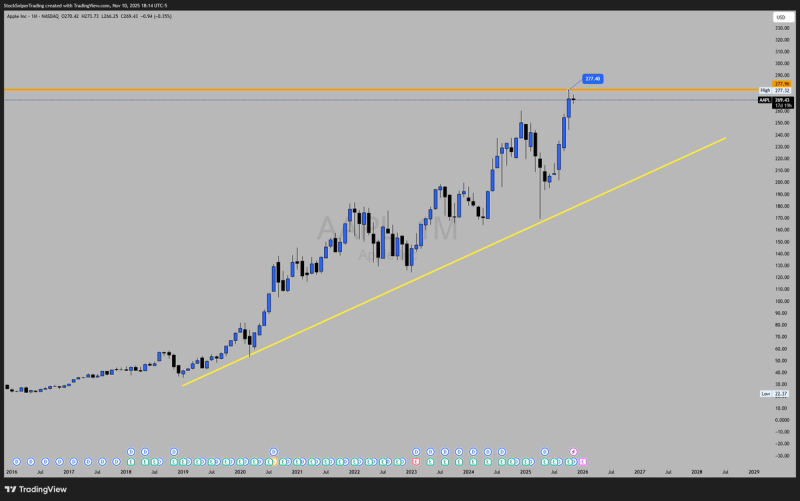Apple Inc. is a leading technology company known for its innovative products, including the iPhone, iPad, Mac computers, Apple Watch, and services like iCloud and Apple Music. It is publicly traded on the NASDAQ stock exchange under the ticker symbol AAPL.

Market Capitalization:
Apple is one of the most valuable companies globally, with a market capitalization often fluctuating above $3.5 - $4 trillion. This valuation reflects investor confidence in Apple's ability to generate consistent revenue growth and maintain its competitive edge in tech innovation.
Share Price:
Apple's share price has experienced significant increases over the years, reflecting its strong financial performance and investor sentiment. The share price is influenced by factors like earnings reports, product launches, broader market trends, and economic conditions. Currently, Apple Inc is trading near it's all time high (ATH) at $277 per share.
Stock Splits:
Apple has implemented several stock splits in its history to make its shares more accessible to a broader range of investors. Notably:
- In 1987, Apple executed a 2-for-1 split.
- In 2000, another 2-for-1 split occurred.
- In 2005, a subsequent 2-for-1 split took place.
- In 2014, Apple performed a 7-for-1 stock split.
- Most recently, in August 2020, Apple executed a 4-for-1 stock split.
These splits have increased the number of shares outstanding while reducing the per-share price, making it easier for small investors to buy shares.
Index Inclusion:
Apple is a component of major stock indices, including:
- S&P 500: A benchmark index including 500 of the largest U.S. companies, representing various industries.
- Dow Jones Industrial Average (DJIA): Apple was added to the DJIA in 2015, replacing AT&T. Its inclusion reflects its influence in the industrial sector despite being a technology company.
- NASDAQ-100: An index comprising the 100 largest non-financial companies listed on the NASDAQ stock exchange.

Tips for Traders and Investors:
1. Research and Analysis: Conduct thorough research on Apple's financial health, including revenue streams, profit margins, and innovation pipeline. Review quarterly earnings reports and keep up-to-date with news about new product launches or strategic changes.
2. Diversification: Avoid putting all your investment into one company. Diversifying across different sectors and asset classes can reduce risk.
3. Long-Term Perspective: Investing with a long-term horizon can help mitigate short-term volatility. Apple's historical performance suggests that patient investors have often been rewarded.
4. Market Conditions: Consider broader market conditions and economic indicators, as these can affect stock performance. During market downturns, even strong stocks like Apple can experience declines.
5. Valuation Metrics: Evaluate Apple's valuation metrics, such as the P/E ratio, compared to industry peers to assess if the stock is reasonably priced.
6. Stay Informed: Keep abreast of technological advances, regulatory changes, and competitive dynamics that could impact Apple's business.
Remember, investing in stocks involves risks, and it's crucial to make informed decisions based on your financial situation and investment goals. Consulting with a financial advisor could also provide personalized guidance tailored to your needs.
Join the Sniper Trading Team today! Stock Sniper Trading

